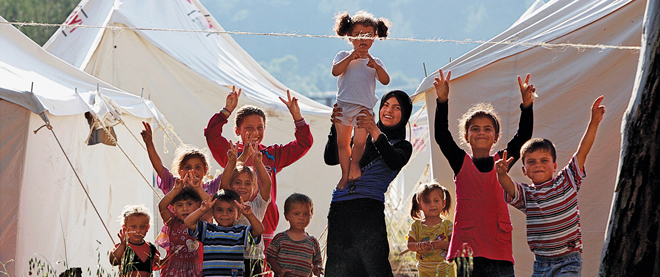Running from Syria’s regime
Refugees at the Turkish border tell of horror and brutality as Bashar al-Assad tries to crush the uprising
Syrian refugee children pose at a refugee camp in the Turkish border town of Yayladagi in Hatay province June 9, 2011. More than 2,400 people have crossed Turkey’s borders fleeing violence in northern Syria, Turkish Foreign Minister Ahmet Davutoglu said on Thursday. REUTERS/Osman Orsal (TURKEY – Tags: POLITICS CIVIL UNREST)
Share

From Guvecci, there is nothing that gives an impression of the brutal civil war playing out in Syria. In this predominantly Arab village in Turkey—the Syrian border a mere kilometre away—olive groves and pomegranate orchards on terraced hillsides blend together in an almost perfect picture of harmony and peace. But over the hills to the east, a massacre is playing out. According to the thousands of people fleeing for safety across Turkey’s border with its troubled neighbour, the Syrian regime has escalated its siege against pro-democracy demonstrators to an unprecedented level.
As of June 14, more than 8,000 people were being sheltered in refugee camps, while an estimated 10,000 more have massed along Syria’s border with Turkey, fleeing what they describe as an all-out assault on unarmed civilian protesters in cities and towns like Latakia, Hamah, Baniyas, and most recently, Jisr ash Shughur, only 15 km from Turkey. Near Guvecci, the displaced are taking shelter in olive groves as near to the Turkish border as they can reach, placing their trust in the Turkish army and the hope that the Syrian military will not dare attack them under the watchful eyes of the Turks and international journalists who have set up their cameras on rooftops in the village.
“They are safe here,” says Nadir Guzmen, a farmer living in Guvecci. “Many of us have family in Syria so these are our own people. We will help them in any way we can; they are welcome to cross the border. I have already helped 20 refugees from Jisr ash Shughur reach the refugee camps here in Turkey. The injuries I’ve seen have been terrible—gunshot wounds, broken faces—it’s really terrible what the Syrian regime is doing to its people. So many of the people I helped take to the hospital have died. This is a genocide.”
Indeed, the consistency of the stories coming out of Syria defy the regime’s official version of events: that armed gangs and fundamentalist Muslims are behind the violence, and it is only these groups the Syrian army is targeting. Residents from Jisr ash Shughur describe a city in the process of being razed to the ground. “All the houses are destroyed; there is no electricity, no water,” says Mehmet, one refugee recovering from a bullet wound in the government hospital in Antakya, 50 km north of the border. “The people who have escaped from there have no place to go back to. They have no way to survive.”
Others say tanks have surrounded the town and helicopters are carrying out indiscriminate bombing raids. Reports also indicate that Iranian snipers, who have joined the Syrian army in cracking down on the uprisings, have taken up positions on rooftops in the town. “They are killing everyone—no one is safe,” says Muhammad Abdel Wahab, a Jisr ash Shughur resident who escaped to Turkey three weeks ago but returned to Syria last week to help other Syrians flee. “Men, women, children, they are all targets.”
The Turkish government, led by newly re-elected Prime Minister Recep Tayyip Erdogan, has, after weeks of keeping its criticism of the Syrian regime to a minimum, come out with some harsh words in the wake of the brutality of the recent crackdowns, calling the Syrian military’s actions “barbaric” and “inhumane,” and telling Syrians they are welcome in Turkey.
Ankara’s mounting criticism points to a government being forced to choose between its friendly ties to Bashar al-Assad, the Syrian president, and its desire to be seen as a regional leader by the Arab street. But despite the harsh words, Turkish authorities here are still preventing journalists from speaking with refugees, possibly to prevent a wave of anti-Syrian rhetoric flooding out of Turkey. “But this is stupid,” says Guzmen, who has been actively helping journalists reach the refugees. “Everyone has cameras and mobile phones. Everyone in Syria is taking photos and sending them, and the press will see them. I have videos from Jisr ash Shughur that I’ve put on the Internet. You cannot stop the flow of information.”
Certainly, the Syrian regime’s attempts to control the message coming out of Syria appears to be failing. In recent days, even members of the military have begun to question its tactics. Soldiers who have deserted and joined the refugee flood into Turkey describe deepening rifts within the armed forces. “There are divisions within the security forces,” says Wahab. “The security forces are seeing the shooting and the killing with their own eyes. So some of them have begun to have mercy on the people and are refusing to shoot at them. Those who are ordering the killings are attacking those who refuse to shoot. The demonstrators haven’t killed any of the security services—never. The soldiers are killing each other.”
For the refugees camped in the olive grove near Guvecci, this is welcome news. Many are refusing to come over to the Turkish side, reluctant to leave their lands and homes behind for an uncertain life as a refugee. “We will stay here until things calm down,” says Faisal. “We can’t go back now—they will slaughter us. We won’t go back until the government falls.”